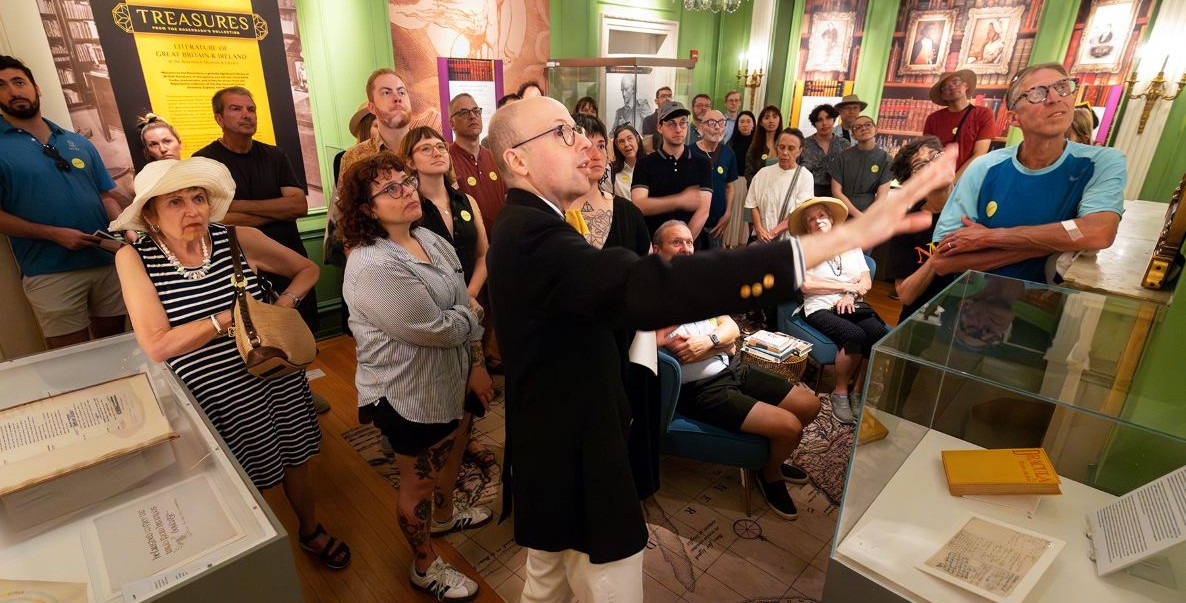Like many museums and libraries across the country, late last week The Rosenbach received notice that our two federal grants—one from the Institute of Museum & Library Services (IMLS) totaling $248,953, and one from the National Endowment for the Humanities (NEH) totaling $330,977— were canceled.
These two grants were meant to improve access to the Rosenbach’s collection of books and manuscripts for people everywhere. The IMLS grant allowed us to create an online catalog for people to discover and learn about, for example, a letter written by John Adams to his four-year-old son, Thomas, or a Pentateuch from 1482. The NEH grant allowed us to fix our long-broken lighting system, enhancing how visitors can see a Sherlock Holmes story in the author’s handwriting or rare issues of Ben Franklin’s Poor Richard’s Almanack, to name two examples.
The several contractors who worked on the NEH-approved lighting project, completed two weeks ago, have been paid. But, like many small nonprofits that survive on donations and grants like these, the Rosenbach will struggle to make up for the loss of reimbursements from the federal government to pay ourselves back.
Our IMLS-funded cataloging project is halted. The project was meant to be substantially completed by July, but we cannot pay our contractor — a company that electronically reads paper cards and digitizes them in bulk — without a grant. Our staff can continue to work toward completion, but it will take them ten times as long to do what a computer can do.
Sudden losses like these erode our ability to hold and share world history, American history, the beauty and power of language, and the most important medium for language the world has ever known: the book. But our small staff at the Rosenbach remains committed to sharing our collection of books and history with as many people as possible because we know that words are more powerful than any other tool in existence.
Sudden losses like these erode our ability to hold and share world history, American history, the beauty and power of language, and the most important medium for language the world has ever known: the book.
Our job just got harder.
At the same time, our job has never been clearer. Close readings of historical documents created by the founders and shapers of our country — from the Federalist Papers to speeches on liberty by Abraham Lincoln — nurture our understanding, broaden our viewpoints, and propose solutions to very current problems.
Likewise, reading literature can be life-changing. I remember my own life changing for the better thanks to early encounters with literature. I was not a strong reader as a young person but was assigned John Steinbeck’s The Grapes of Wrath for a high school book report. It was challenging for me to read, but with the turn of each page, my mind expanded a little more. I read about how other people — in my own country — had lived and was introduced to the value of experiences very different from my own. The depth of understanding I felt, conveyed through Steinbeck’s language, and the hope for humanity his words reflected, poured through the pages to me and by the end of the book, my small, teenage world had grown a little wider. It gave me perspective that has never left, and it made me a lifelong reader.
The Rosenbach exists to nurture moments like these, and we believe that nourishment leads to a more well-rounded and wiser citizenry. In other words: investing in reading, language, and history is good for individuals and good for our country.
While these grants mean so much to institutions like the Rosenbach, which runs on a modest $2 million budget, they are a relatively small investment for the federal government. IMLS funding represents 0.0046 percent of the federal budget, and NEH, even less. Considering what they allow museums and libraries to do for our citizens, grants from these organizations result in an undeniably positive return on investment. Please call or email your representatives immediately and ask them to work to reinstate IMLS and NEH funding! If you need assistance contacting your representatives, please use this letter as a guide.
Let’s all remember the moments in our lives when language changed us: which text, which author, which words turned on the light in your brains and hearts? Let’s fight for those experiences for everyone.
Kelsey Scouten Bates is the John C. Haas Director of the Rosenbach Museum & Library, one of our country’s most treasured cultural institutions, renowned for its rare book and manuscript collections.
The Citizen welcomes guest commentary from community members who represent that it is their own work and their own opinion based on true facts that they know firsthand.
![]() MORE ON NAVIGATING THE FEDERAL COLLAPSE
MORE ON NAVIGATING THE FEDERAL COLLAPSE




